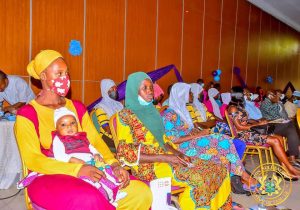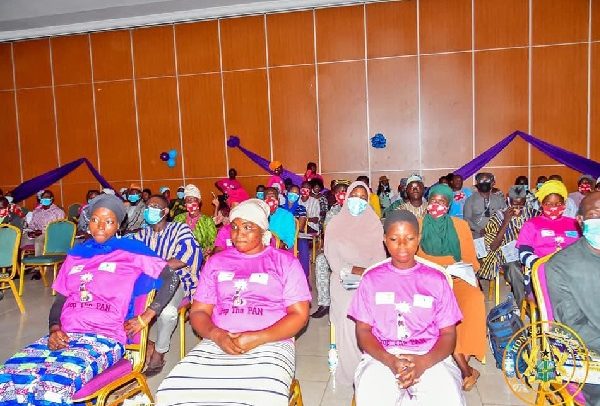Some of the Kayayei’s at the National Dialogue in Tamale
The former Minister of Gender, Children and Social Protection, and now Executive Director of the Henry Djaba Memorial Foundation, Otiko Afisah Djaba, has revealed that about 100,000 girls are engaged in Kayayei from the Northern part of Ghana.

According to her , over 1,000 girls are leaving daily from the North to Techiman, Kumasi, Takoradi and Accra.
“ These girls turn to Kayayei because of lack of infrastructure in our rural communities, poverty, abuse, forced and early childhood marriage, peer pressure, and the search for a way out.”
She said Kayayei is a failure of parents, the government system and duty bearers, the community, traditional leaders, stakeholders, and the girls themselves adding that Kayayei is purely modern-day slavery and the girls are slaves to a society that has failed them.
The Executive Director of the Henry Djaba Memorial Foundation, made this known at a National Kayayei Dialogue in partnership with UNFPA to enable them share ideas and identify sustainable solutions to address the welfare challenges of the girls in Tamale in the Northern Region.
Madam Djaba called on stakeholders to give the girls a chance and a break by taking collective responsibility and action to give them a better future with great opportunities.
“ These girls have been struggling with the scars of poverty, hunger, fear of abuse, and violence for over 40 years. The girls and women are growing up with huge baggage of lost dreams and health issues. We need to awaken our conscience, parental and government responsibilities, feelings of protection and provision of a better life for our girls with collective solutions.”
She charged parents, the transport owners, kiosk owners, shower and toilet owners, the traders, and shoppers who are benefiting and profiting from the Kayayei to man up and do the right things by these girls.
“ Are the girls not worth fighting for? I challenge government and the assemblies to provide aggressive investments in the infrastructure of our rural communities to increase growth, provide alternative livelihood opportunities and reduce rural migration of our girls.”
She encouraged Chiefs, MMDCEs, Assembly members, Imams, Priests, to search for investors for rapid development of communities and to sensitize their people aggressively about Kayayei and entreat all to join them help the girls to drop the pan and pick up their future.
The Metropolitan Chief Executive of Tamale, Sule Salifu said the young girls toil daily as human mules carrying and carting goods to survive but unfortunately in their quest to seek greener pastures, they are prone to all kinds of challenges in their destination points dangers such as sexual abuse, teenage pregnancy, gender-based violence, hunger, poor health, and inhumane accommodation conditions.
The Tamale Mayor expressed optimism that the National Kayayei Dialogue outcome objectives will help advocate for the enactment of a legislature thus, a National Porters Bill; and establishing a sustainable network of partners and stakeholder organizations.
He assured stakeholders that his office will ensure that an enabling environment is created to prevent the young girls in the region from traveling to the South to engage in Kayaye.
FROM Eric Kombat, Tamale


